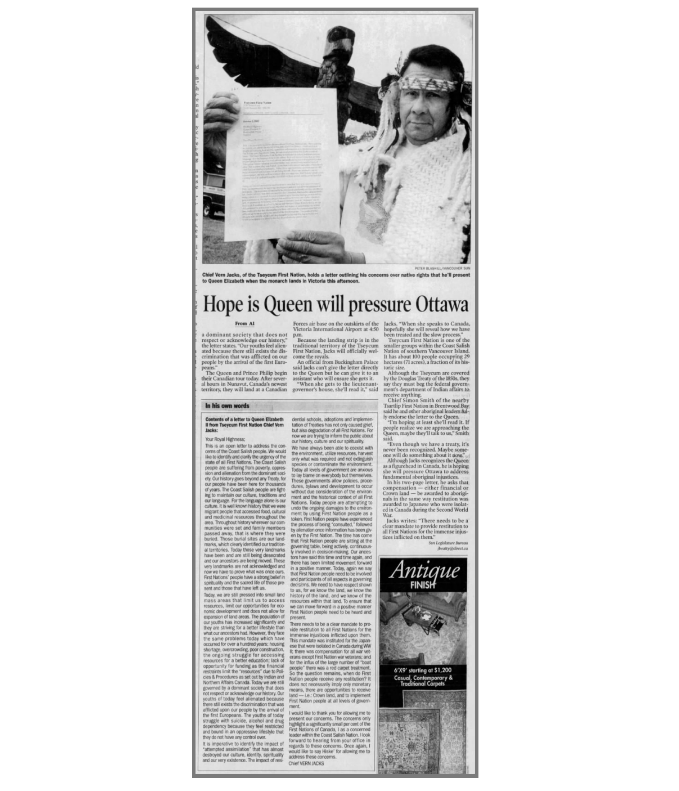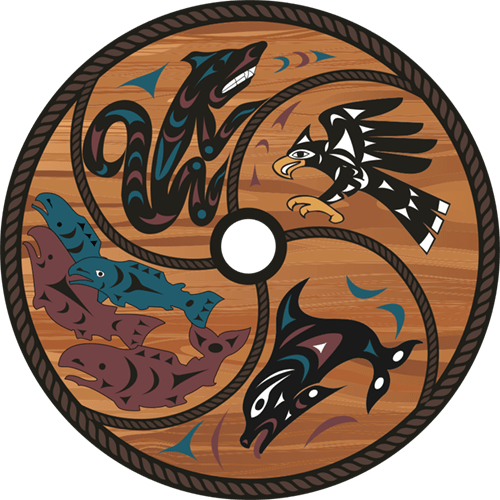
Hope is Queen will pressure Ottawa
IMAGE CAPTION: Chief Vern Jacks, of the Tseycum First Nation, holds a letter outlining his concerns over native rights that he’ll present to Queen Elizabeth when the monarch lands in Victoria this afternoon.
“A dominant society that does not respect or acknowledge our history,” the letter states. “Our youths feel alienated because there still exists the discrimination that was afflicted on our people by the arrival of the first Europeans.”
The Queen and Prince Philip begin their Canadian tour today. After several hours in Nunavut, Canada’s newest territory, they will land at a Canadian Forces air base on the outskirts of the Victoria International Airport at 4:50 p.m.
Because the landing strip is in the traditional territory of the Tseycum First Nation, Jacks will officially welcome the royals.
An official from Buckingham Palace said Jacks can’t give the letter directly to the Queen but he can give it to an assistant who will ensure she gets it.
“When she gets to the lieutenant-governor’s house, she’ll read it,” said Jacks. “When she speaks to Canada, hopefully she will reveal how we have been treated and the slow process.”
Tseycum First Nation is one of the smaller groups within the Coast Salish Nation of southern Vancouver Island. It has about 100 people occupying 29 hectares (71 acres), a fraction of its historic size.
Although the Tseycum are covered by the Douglas Treaty of the 1850s, they say they must beg the federal government’s department of Indian affairs to receive anything.
Chief Simon Smith of the nearby Tsartlip First Nation in Brentwood Bay said he and other aboriginal leaders fully endorse the letter to the Queen.
“I’m hoping at least she’ll read it. If people realize we are approaching the Queen, maybe they’ll talk to us,” Smith said.
“Even though we have a treaty, it’s never been recognized. Maybe someone will do something about it now.”
Although Jacks recognizes the Queen as a figurehead in Canada, he is hoping she will pressure Ottawa to address fundamental aboriginal injustices.
In his two-page letter, he asks that compensation – either financial or Crown land – be awarded to aboriginals in the same way restitution was awarded to Japanese who were isolated in Canada during the Second World War.
Jacks writes: “There needs to be a clear mandate to provide restitution to all First Nations for the immense injustices inflicted on them.”
Sun Legislature Bureau
jbeatty@direct.ca
In his own words
Contents of a letter to Queen Elizabeth II from Tseycum First Nation Chief Vern Jacks:
Your Royal Highness:
This is an open letter to address the concerns of the Coast Salish people. We would like to identify and clarify the urgency of the state of all First Nations. The Coast Salish people are suffering from poverty, oppression and alienation from the dominant society. Our history goes beyond any Treaty, for our people have been here for thousands of years. The Coast Salish people are fighting to maintain our culture, traditions and our language. For the language alone is our culture. It is well known history that we were migrant people that accessed food, cultural and medicinal resources throughout the area. Throughout history wherever our communities were set and family members passed away, that is where they were buried. Those burial sites are our landmarks, which clearly identified our traditional territories. Today those very landmarks have been and are still being desecrated and our ancestors are being moved. These very landmarks are not acknowledged and now we have to prove what was once ours. First Nations’ people have a strong belief in spirituality and the sacred life of those present and those that have left us.
Today, we are still pressed into small land mass areas that limit us to access resources, limit our opportunities for economic development and does not allow for expansion of land areas. The population of our youths has increased significantly and they are striving for a better lifestyle than what our ancestors had. However, they face the same problems today which have occurred for over a hundred years: housing shortage, overcrowding, poor construction, the ongoing struggle for accessing resources for a better education; lack of opportunity for funding as the financial restraints limit the “resources” due to Policies & Procedures as set out by Indian and Northern Affairs Canada. Today we are still governed by a dominant society that does not respect or acknowledge our history. Our youths of today feel alienated because there still exists the discrimination that was afflicted upon our people by the arrival of the first Europeans. The youths of today struggle with suicide, alcohol and drug dependency because they feel restricted and bound in an oppressive lifestyle that they do not have any control over.
It is imperative to identify the impact of “attempted assimilation” that has almost destroyed our culture, identity, spirituality and our very existence. The impact of residential schools, adoptions and implementation of Treaties has not only caused grief, but also degradation of all First Nations. For now we are trying to inform the public about our history, culture and our spirituallity.
We have always been able to coexist with the environment, utilize resources, harvest only what was required and not extinguish species or contaminate the environment. Today all levels of government are anxious to lay blame on everybody but themselves. These governments allow policies, procedures, bylaws and development to occur without due consideration of the environment and the historical context of all First Nations. Today people are attempting to undo the ongoing damages to the environment by using First Nation people as a token. First Nation people have experienced the process of being “consulted,” followed by alienation once information has been given by the First Nation. The time has come that First Nation people are sitting at the governing table, being actively, continuously involved in decision-making. Our ancestors have said this time and again, and there has been limited movement forward in a positive manner. Today, again we say that First Nation people need to be involved and participants of all aspects in governing decisions. We need to have respect shown to us, for we know the land, we know the history of the land, and we know of the resources within that land. To ensure that we can move forward in a positive manner First Nation people need to be heard and present.
There needs to be a clear mandate to provide restitution to all First Nations for the immense injustices inflicted upon them. This mandate was instituted for the Japanese that were isolated in Canada during WW II; there was compensation for all war veterans except First Nation war veterans; and for the influx of the large number of “boat people” there was a red carpet treatment. So the question remains, when do First Nation people receive any restitution? It does not necessarily imply only monetary means, there are opportunities to receive land – i.e.: Crown land, and to implement First Nation people at all levels of government.
I would like to thank you for allowing me to present our concerns. The concerns only highlight a significantly small per cent of the First Nations of Canada, I as a concerned leader within the Coast Salish Nation, I look forward to hearing from your office in regards to these concerns. Once again, I would like to say Hiske’ for allowing me to address these concerns.
Chief VERN JACKS






